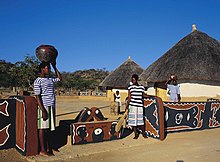
Back Noord-Sotho's AF Педы BE Pedi German Pedioj EO Pedi (herria) EU Pedi (peuple) French Pedi Croatian Педи KK Bapedi LT Pedi Dutch
Bapedi | |
|---|---|
 Pedi living culture route Limpopo, South Africa | |
| Total population | |
| 7,004,000[1] | |
| Regions with significant populations | |
| 4,618,576 (9.1% of population) | |
| 14,000 | |
| Languages | |
| First language Pedi Second language English, Afrikaans, other South African Bantu languages | |
| Religion | |
| Christianity, African traditional religion | |
| Related ethnic groups | |
| Lobedu people, Sotho people, Tswana people, Pulana people, Lozi people, Kgalagadi people, Tlôkwa people, and other Sotho-Tswana peoples | |
| Pedi | |
|---|---|
| Person | Mopedi |
| People | Bapedi |
| Language | Sepedi |
| Country | Bopedi |
The Pedi /pɛdi/ or Bapedi /bæˈpɛdi/ - also known as the Northern Sotho,[2] Basotho ba Lebowa, bakgatla ba dithebe,[3] Transvaal Sotho,[4] Marota, or Dikgoshi[5] - are a Sotho-Tswana ethnic group native to South Africa, Botswana, and Lesotho that speak Pedi or Sepedi,[6] which is one of the 12 official languages in South Africa.[7] They are primarily situated in Limpopo, Gauteng and northern Mpumalanga.[8]
The Pedi people are part of the Bantu ethnic group. Their common ancestors, along with the Sotho and Tswana, migrated from East Africa to South Africa no later than the 7th century CE. Over time, they emerged as a distinct people between the 15th and 18th centuries, with some settling in the northern region of the Transvaal. The Pedi maintained close ties with their relatives and neighboring tribes.[9]
Towards the end of the 18th century, the primary Pedi state was established, led by supreme leaders from the Maroteng clan. In the early 19th century, the Pedi state faced significant challenges from the Nguni, particularly the Northern Ndebele under Mzilikazi[10] and the Swati. A pivotal figure in preserving the Pedi state was Sekwati I[11] (1827–1861), the paramount leader who introduced reforms in the military and internal administration and welcomed Christian missionaries.
After Sekwati I's passing, his son Sekhukhune took control but reversed some reforms, including Christianization. From 1876 to 1879, the Pedi engaged in wars with the Boers and the British, resulting in defeat and the Pedi state falling under Boer influence. In 1882, Sekhukhune was assassinated by conspirators, leading to the dismantling of the monarchy and statehood. In 1885, the Transvaal government only allocated a small territory to the Pedi, with the majority of the people living outside of it.
In the 1950s, the Sotho language committee recognized the Pedi language as distinct from Sesotho.
Throughout history, the Pedi actively participated in the struggle against colonization and apartheid in South Africa, joining the broader movement of African peoples fighting for their rights and freedom.
- ^ Cite error: The named reference
joshuaproject.netwas invoked but never defined (see the help page). - ^ "Sotho | South Africa, Lesotho, Language | Britannica". www.britannica.com. Retrieved 22 August 2023.
- ^ "free online course". www.unisa.ac.za. Retrieved 22 August 2023.
- ^ Joubert, Annekie; Grobler, Gerrie; Kosch, Inge; Kriel, Lize (1 January 2015), "Article 21 (1957). Customs and Traditions of the Sotho People in Northern Transvaal—Mekgwa le botlwaelo bja Basotho ba Transfala-Lebowa", Ethnography from the Mission Field, Brill, pp. 898–939, ISBN 978-90-04-29772-2, retrieved 3 August 2023
- ^ "History of the Pedi". southafrica.co.za. Retrieved 3 August 2023.
- ^ Allen, Harold B.; Linn, Michael D., eds. (1 January 1986), "Introduction to Dialect Theory", Dialect and Language Variation, Boston: Academic Press: 3–4, doi:10.1016/b978-0-12-051130-3.50005-7, ISBN 978-0-12-051130-3, retrieved 14 February 2021
- ^ "Constitution of the Republic of South Africa, 1996 - Chapter 1: Founding Provisions | South African Government". www.gov.za. Retrieved 20 July 2023.
- ^ "Culture – Limpopo Provincial Government". www.limpopo.gov.za. Retrieved 23 July 2023.
- ^ "Pedi - African Tribe - South Africa..." www.krugerpark.co.za. Retrieved 23 July 2023.
- ^ "Bapedi history, traditions, culture and food (ZA)". www.southafrica.net. Retrieved 23 July 2023.
- ^ "Bapedi history, traditions, culture and food (BW)". www.southafrica.net. Retrieved 3 August 2023.